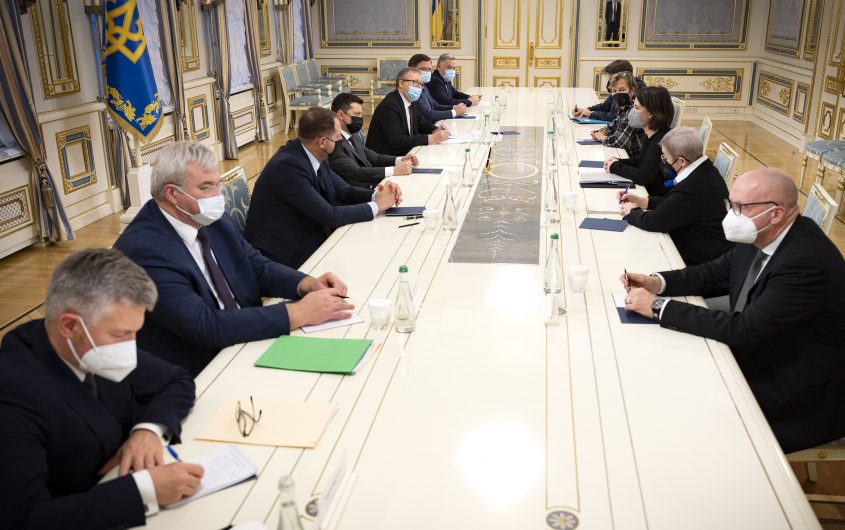
President of Ukraine via Wikimedia Commons
Averting War in Ukraine

Andrew Denison
Transatlantic Networks
Dr. Andrew Denison is director of Transatlantic Networks. Dr. Denison lectures regularly to various publics throughout Germany and serves frequently as a commentator on German radio and television. Dr. Denison received his Ph.D. from the Nitze School of Advanced International Studies at the Johns Hopkins University in Washington, D.C.; his M.A. from the University of Hamburg; and his B.A. from the University of Wyoming. Andrew Denison grew up in Laramie, Wyoming and is a bicyclist, backpacker, husband, and father of two sons.
Germany is Needed
Strengthening military deterrence in Europe is the surest way to avert war—or at least to minimize the damage Putin’s armies can do and their prospect for success. But without significant German military support, deterrence and damage-limitation are more challenging, Western credibility is weaker, and Putin’s leverage is stronger. Instead of reassuring Russia, Germany’s reluctance could well motivate Russia to try to use Ukraine to split Germany from America and NATO—and in Putin’s grand plan for Europe, little is more important.
The German people increasingly understand that Putin will find a pretext for invasion, no matter how deferential Berlin is. Yet the Scholz government is slow in adjusting to the new reality.
Germany’s new government must push back and put its strength behind the principles that undergird the European Peace. Few countries have benefited as much from national sovereignty, open alliances, and collective self-defense as the Federal Republic. Germany has proven itself in its role as mediator and bridge builder, and in the process has become the most prosperous, if not the most powerful country in Europe.
Germany Must Do More
Germany must do more to maintain the strategic balance in Europe. Germany needs to contribute to military deterrence in Europe commensurate with its size, wealth, and geopolitical importance. Germany should not only “continue to support Ukraine in restoring full territorial integrity and sovereignty,” as stated in the new SPD-Green-FDP government’s coalition agreement but also do more to strengthen military deterrence in Europe and Ukraine.
The German government should use the leverage at hand and agree to the Ukrainian requests for military equipment, including defensive weapons. “It is primarily about German warships, which are among the best in the world, which we urgently need for the robust defense of the long coastline in the Black and Azov Seas,” Ukrainian Ambassador in Berlin, Andriy Melnyk, told Deutsche Presse-Agentur on January 19. “There is the same huge need for state-of-the-art air defense systems, which German defense companies are producing right now,” the diplomat added. The Ukrainians know best what they need, but possibilities abound. Available anti-tank weapons include Panzerfaust 3, Spike LR, Milan; man-portable air-defense systems (MANPADS) include Stinger 2 and Mistral. Explosives and demolitions would also be important to slow the movement of heavy Russian forces.
Germany needs to contribute to military deterrence in Europe commensurate with its size, wealth, and geopolitical importance.
In signaling resolve, the German government needs to commit, publicly and emphatically, to the significance of military deterrence and Ukraine’s legal right to international support for its self-defense. In doing so, the Scholz government should make clear that these arms deliveries will be increased if Russia attacks Ukraine. The government should not underestimate the German public’s willingness to support such measures if clearly told what is at stake.
At the same time, Germany should prepare for the consequences of a major war in Europe. Russia could stop supplying its gas. Cyber-attacks will surely increase. 43 million Ukrainians could face a humanitarian catastrophe the likes of which Europe has not seen since World War II. It is not too early to prepare for a wave of (weaponized) refugees numbering even larger than what Europe faced in 2015. Germany’s corona-affected hospitals could be lifesavers for war-wounded from Ukraine. Resilience and preparation have their own deterrent power. If war comes, few countries will be able to help as much as Germany.
Putin Expects German Weakness
Putin thinks the new German government is weak and inexperienced and that he can use this to his advantage. Perhaps Putin believes he can blackmail the Germans into closing their territory to arms shipments to Ukraine. Chancellor Scholz must counter this impression by taking a leadership role in strengthening military deterrence in Ukraine. Germany has an arsenal and a defense industry like few others in the world. Arms exports in 2021 set a new record at 9.3 billion euros, the world’s fourth-largest. Sadly, sending 5,000 combat helmets to Ukraine only makes Germany look weak.
German Support for NATO Air Superiority
A more pronounced German role in supplying effective defensive weapons to Ukraine is necessary but not sufficient. If the Russian invasion were to falter—and there are many reasons to believe it could—the Russians would also have to know that it would make no sense to escalate militarily, for example, by trying to use force to prevent the delivery of Western weapons, or worse, the evacuation of Western nationals.
The United States and some NATO countries are now countering just such Russian options. Not wanting to offer the Russians an open eastern flank, NATO aircraft are rotating through Poland, Romania, and Bulgaria. Germany should support this NATO deterrence by fulfilling its important role as a secure operating base, but also by sending German Eurofighters, reconnaissance Tornados, and Patriot air defense to Romania or Bulgaria, along with mobile ground support to operate from smaller airports. Germany should follow France’s example in sending ground troops to Romania.
If Germany is not prepared to contribute more to European military deterrence, then Germany is once again endangering European peace.
The danger posed by Russian missile forces should move the German government to step up cooperation with NATO to reduce the vulnerability of airfields and harbors such as Ramstein, Frankfurt, Bremerhaven. Russia should not be tempted to threaten Germany if its offensive in Ukraine were about to fail.
Finally, and most existentially, Putin must be convinced that any use of nuclear weapons would only make things worse for him. He must hear this not only from Washington, London, and Paris but also and especially from Berlin. While controversial, for the government to conceal Germany’s own important nuclear deterrent role would be worse. Moscow must know that little is to be gained by threatening nuclear escalation—or trying to split Germany from the Alliance on this question.
Rise to the Occasion
The new government must reinforce Germans’ emerging recognition that the European Peace is not self-sustaining, that Russia’s interests are now largely incompatible with those of Europe, and that Europe cannot deter Russian aggression without the commitment and leadership of Europe’s largest country.
The German people are not immune to the argument that Germany, as the wealthiest and most influential EU member, has a special responsibility to strengthen military deterrence in Europe—and not to hide behind Germany’s past. They can understand the danger Putin poses to European solidarity.
Germany should rise to the occasion and take a leadership role in preventing war and keeping the peace in Europe. If Germany is not prepared to contribute more to European military deterrence—and to do so in proportion to Germany’s geostrategic importance—then Germany is once again endangering European peace, albeit unintentionally.








